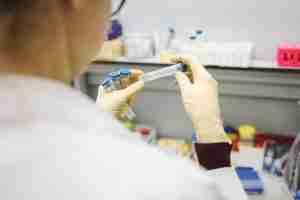
Orgenesis and Johns Hopkins Partner to Boost Cell and Gene Therapy Manufacturing for Point of Care Treatment in Baltimore
A new cell and gene therapy point of care treatment facility at Johns Hopkins University, expected to open in 2023, has boosted both the state’s importance, as well as Baltimore’s importance as a lynchpin in the cell and gene therapy industry.
The planned 7,000 square-foot point of care facility is a joint project between the university and Germantown-based Orgenesis. The new center has been funded in part by a $5 million grant from the state of Maryland, and construction on the site is expected to begin in the second quarter of this year. The new site is expected to provide clinicians and researchers based at Johns Hopkins with cutting-edge tools that are expected to provide a more streamlined path from the lab to clinical trials to treat patients with a myriad of diseases at the point of care.
Luke Thorstenson, Director of Business Development at Orgenesis, said that the new point of care center, or POCare Center, “from a Maryland biotech enthusiast perspective, is wanted and needed.” In an interview with BioBuzz, Thorstenson noted that for years, some of the best science in the country has come out of Johns Hopkins. Much of that science would end up out-licensed out of state for further development. This new center will allow that science to remain in Baltimore for potential advancement.
“Development of a robust biotech ecosystem in Baltimore is an admirable goal for the state,” he said. “Baltimore should be as much of a player in the country’s ecosystem as other regions. Our new facility adds another tool for ecosystem development and will keep the processing and manufacturing of these cell and gene therapies localized at the point of care.”
For Orgenesis, which has a goal of enabling the full potential of cell and gene therapies at an affordable and accessible format, the establishment of the point of care center at Hopkins is a key public-private partnership. Orgenesis leverages its POCare Platform to identify promising new cell and gene therapies and guide them through development in order to treat patients at a lowered cost.
Orgenesis is currently using lab space at FastForward, Johns Hopkins Technology Ventures’ (JHTV) innovation hub. FastForward is an accelerator that offers startups mentorship, workspace, and professional services, as well as funding opportunities. Thorstenson touted the work performed by JHTV and noted that it has been critical to the success of Maryland’s life sciences ecosystem and will be an ideal partner for its POCare Platform.
Since its founding in 2014, JHTV has had an immediate and dramatic impact. JHTV helps Hopkins faculty turn their discoveries into marketable products and services. JHTV has assisted with hundreds of licensed therapeutics in development and backed nearly 200 startups that have collectively nearly $3 billion in venture capital funding, 30% of which has remained in the state.
“From a company standpoint, working with Johns Hopkins is key for us. This is where we’re staking our flag on the east coast for our point of care platform. In addition to functioning as a typical POCare Center – Quality Control, warehouse, clinical/GMP manufacturing – the new facility will serve as our North American center of excellence for process development,” he said.
The POCare Center, also known as the Maryland Center for Cell Therapy Manufacturing, is expected to enhance local capacity for processing of clinical therapeutics at the point of care, significantly reducing production costs through the elimination of transportation/logistic complexities, Thorstenson said.
Victor Lemas, director of the cell therapy laboratory at Johns Hopkins Medicine, said there are numerous investigators at Hopkins who are interested in developing and manufacturing their novel therapies. The POCare site will provide the university with the equipment and expertise to meet their needs, he said.
“Having Orgenesis on campus provides an opportunity for the investigator to closely collaborate with the Orgenesis experts to accurately translate cell therapy innovations from the laboratories to the patient clinics,” Lemas said in a statement
When the new cell and gene therapy site is operational, Orgenesis will house an expected 30 employees. When it’s operational, Thorstenson said there will be a rapid scale-up of processing capacity through the Orgenesis Mobile Processing Units and Labs (OMPULs). With the OMPUL, he said Orgenesis and Hopkins can move efficiently from scientific discovery to process development (“OMPULization”) to clinical trial to treatment of patients.
According to company data, OMPULs may shorten the implementation time of new capacity from 18-24 months to 3-6 months. Each point of care center will be able to service multiple OMPULS, with the first one expected to deploy in Maryland later this year. While many companies opt for centralized manufacturing centers, Thorstenson said the OMPUL decentralized approach is believed to be more cost-effective. Not only will a decentralized approach be more cost-effective, Thorstenson suggested that such an approach can boost multi-site clinical trials as well.
With the OMPUL model at Hopkins, Thorstenson said the goal will be to reduce production costs and provide scalable solutions. The motto for this approach is “affordable, accessible, available now,” he said.
“The future is now. We truly believe in all of the great work that’s being done around the field and we’re happy to work with all of the technology developers. We’re here for the future but also today, to lower prices now,” he said. “We believe in the Maryland ecosystem, it’s a strategic priority for us. I’m a big believer that Baltimore can be as big a biotech hub as Philly.”






